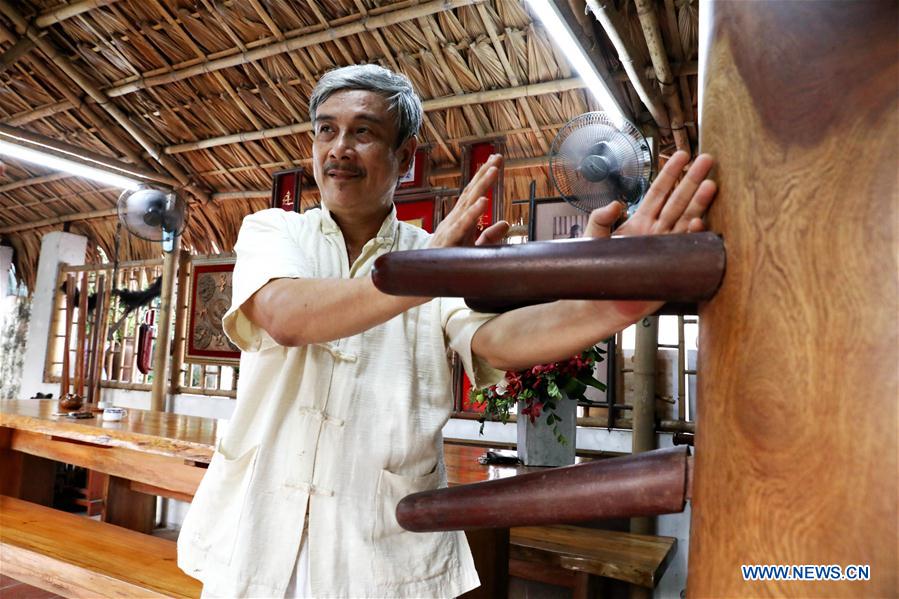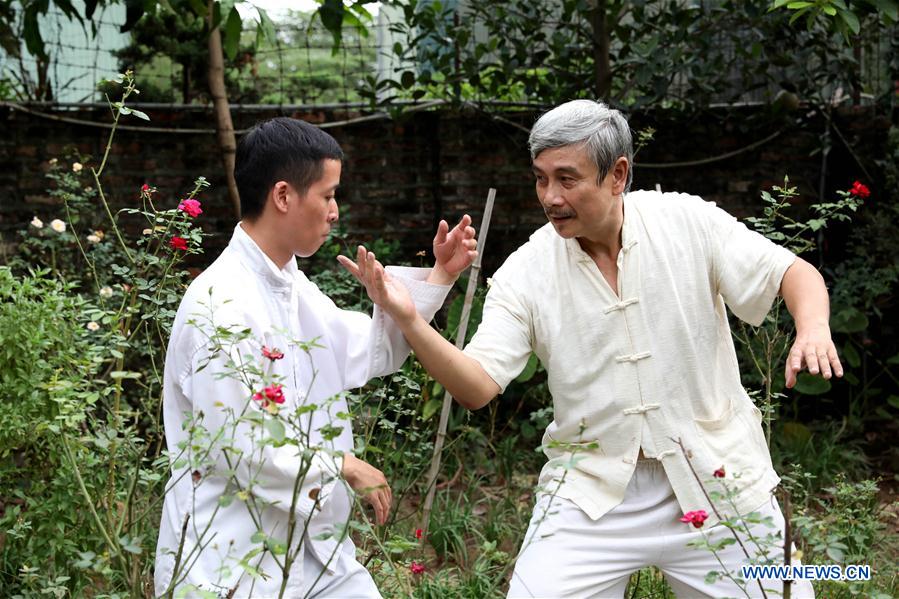Feature: Vietnamese Kung Fu, traditional medicine master heals, strengthens people's hearts
Source: Xinhua| 2019-10-31 23:02:30|Editor: Shi Yinglun

Vietnamese Wing Chun master Tran Viet Trung demonstrates techniques by beating a wooden dummy in Hanoi, capital of Vietnam, Aug. 25, 2019. Sat in a cozy room full of books, herbal medicine and cold remedies on the tranquil outskirts of Vietnam's capital Hanoi is a grey-haired businessman who has created a new school of Wing Chun, cured patients based on Chinese martial arts and medicine, and written best-selling books about the two spheres.(Xinhua/Wang Di)
by Tao Jun, Wang Di
HANOI, Oct. 31 (Xinhua) -- Sat in a cozy room full of books, herbal medicine and cold remedies on the tranquil outskirts of Vietnam's capital Hanoi is a grey-haired businessman who has created a new school of Wing Chun, cured patients based on Chinese martial arts and medicine, and written best-selling books about the two spheres.
In Tran Viet Trung's room, above a bookcase packed with Chinese, English, Vietnamese dictionaries, medicine books and novels is an altar with portraits of four well-known Kung Fu grand masters and physicians, including those of Nguyen Te Cong, the Chinese founder of Wing Chun in Vietnam and one of his first Vietnamese proteges Ngo Sy Quy.
Sitting near an antique medicine cabinet with dozens of drawers filled with herbs, minerals and animal bones, the 60-year-old businessman in a milk white costume recalled the ups and downs in his life, especially his lucky chances of meeting highly respected Kung Fu masters and physicians who inspired him to follow the path of eastern martial arts as well as medicine.
"When I was eight years old, my father passed away. Weak and bullied by other children, I wanted to learn martial arts to make myself stronger," Trung told Xinhua.
As a teenager and during the war, Trung could not completely devote himself to studying martial arts, but he never gave up on his burning desire to master it.
"If you have a passion and keep pursuing it, you will eventually make it," the wise man said, while casting an eye over the portraits on the altar.
After graduating from the Foreign Trade University in Hanoi, Trung met Ngo Sy Quy, one of the first Vietnamese proteges of Chinese-born Yuen Chai Wan, better known as Nguyen Te Cong in Vietnamese, the founder of Wing Chun in Vietnam.
Wing Chun is a concept-based traditional Chinese Kung Fu style which requires practitioners to undergo intensive physical, mental, breathing, energy and force training in a relaxed manner. Famous for quick arm movements, it maintains practitioners' flexibility and softness, as well as develops the strength to fight back, like the flexible nature of bamboo. Notable Chinese practitioners of Wing Chun include Ip Man, Bruce Lee and Donnie Yen.
"After coming to Vietnam in the late 1930s, Cong taught Wing Chun to local proteges, including my master Ngo Sy Quy," said Trung.
Trung added that he has visited China's southern Guangdong province, hometown of Nguyen Te Cong, and talked to Chinese Wing Chun masters there, to obtain a better understanding of the martial art's origin and its development in Vietnam.
"Soon after I studied Wing Chun from Ngo Sy Quy, he told me to teach my own students, while studying from him at the same time. I was surprised because I was just a student, so wondered how could I teach others?" Trung recalled. But Trung followed the advice of his master who said: "When we already know the general, we should practice the specific and teaching students is the best way to practicing the specific."
Since the late 1980s, Trung has taught Wing Chun to many students in Hanoi, first at martial arts centers in the bustling downtown district, and then in the tranquil countryside at his new house adjacent to a pagoda and a communal temple. In 1987, he asked for his master's permission to establish a new school of Wing Chun named "Duong sinh nhu quyen." "Duong sinh" means life nourishment, and "nhu quyen" means soft martial art.
"I created the new school to make Wing Chun more suitable to the physique and stature of Vietnamese people and to the modern times, focusing on softness and flexibility factors like snakes and cranes," Trung explained.
In a mid-autumn afternoon in his house's garden full of roses and bamboo, Trung's bright eyes were glued to the arm movements of his students, both elderly like Dang Manh Hung, who has followed him for over 30 years, and young like Khuong Truyen Phuong, who was born in 1993.
Sometimes the grey-haired teacher stopped his students to show them how to punch or kick more quickly and effectively, or skillfully demonstrated techniques of beating a wooden dummy, a typical training tool of Wing Chun practitioners. His movements were as continuous and smooth as flowing water and passing clouds at this time, but as powerful and quick as lightning.
As a businessman, Trung runs a factory which produces handcrafted painting tools for export to support his family, and spends a lot of time wholeheartedly teaching martial arts free of charge, as well as using traditional medicine to cure sick people at little charge.
"I don't make a living by teaching martial arts or practicing traditional medicine. No matter how modern societies have become, we still have 'dao nghia' (sets of basic human relationships) because if we live in a rightful, sincere manner, with care and sacrifice, we will receive priceless things," said Trung.
When Trung made the statement, a graceful woman, who looked much younger than her age of 60, came across, gleefully telling Xinhua that thanks to martial arts, they became a couple.
"When I was young, one day, I saw him settling a street fight with both strength and manners, I fell in love at first sight," Tran Hong Minh said with a smile.
And she is also the one that made Trung a practitioner of traditional medicine. Years ago, his wife, Hong Minh, fell ill, and was cured by Nguyen Dinh Tich, chairman of the Vietnam Orientally Traditional Medicine Association, the latter then advised Trung to study traditional medicine. On the altar there are four portraits, including those of Nguyen Dinh Tich and Le Huu Trac, father of Vietnamese traditional medicine.
"My master told me to learn traditional Chinese characters so that I could read original classic books about Chinese medicine. Now I have carefully read most of the classic works of Chinese and Vietnamese great traditional physicians," Trung stated. Above the medicine cabinet in Trung's room, there are portraits of six great Chinese physicians, including Bian Que, Hua Tuo, Sun Simiao, Huang Pumi, Li Shizhen and Zhang Zhongjing.
According to Trung, traditional medicine and traditional martial arts "seem to be interrelated, always supporting each other to cure the sick and protect the weak," and the two are never of the past, but of the present, providing practitioners receive good training and working environments.
To preserve and promote traditional medicine and martial arts, Trung not only offers almost-free medical treatment and teaches Wing Chun free of charge, but also writes books about the two practices.
"I wrote 'Quyen su' (Kung Fu Master) based on the marital art life of grandmaster Nguyen Te Cong and my master Ngo Sy Quy and 'Su de' (Disciple) about their students as a way of keeping these memories alive for future generations, and disseminating stories with educational values to a bigger audience," Trung said, noting that "Quyen su" has been reprinted five times so far. He also wrote a book about traditional medicine based on the image of his teacher.
"This year, I will publish a book about my parents, especially about the life of my father, Tran Tu Binh, one of the first 11 military generals of the People's Army of Vietnam. He worked as the Vietnamese ambassador to China in the 1959-1967 period," Trung said eagerly, recalling his moments of joyfully playing in Beijing as a toddler.
"I was named Viet Trung (Vietnam-China) because my father at that time worked as an ambassador to China," Trung said, noting that his father spared no efforts to help develop the fine friendship and cooperation between the two countries.
Now, Trung wants the values of traditional medicine and martial arts, especially those of Vietnam and China, the foundation of the two time-honored heritages, to benefit more and more people and be passed from generation to generation.
"Traditional medicine and martial arts are never backward, they will continue on through the future history of mankind, and people nowadays should preserve and bring them into play," stated the Kung Fu master-cum-doctor and father of three.
Right beside the altar honoring Trung's Kung Fu and medicine masters, there is a Chinese calligraphy distich written on red paper which reads: "Medicine heals the diseases of era. Martial arts conquer the hearts of people."

Vietnamese Wing Chun master Tran Viet Trung (R) teaches his student about Wing Chun skills in Hanoi, capital of Vietnam, Aug. 25, 2019. Sat in a cozy room full of books, herbal medicine and cold remedies on the tranquil outskirts of Vietnam's capital Hanoi is a grey-haired businessman who has created a new school of Wing Chun, cured patients based on Chinese martial arts and medicine, and written best-selling books about the two spheres.(Xinhua/Wang Di)



 Reply With Quote
Reply With Quote






